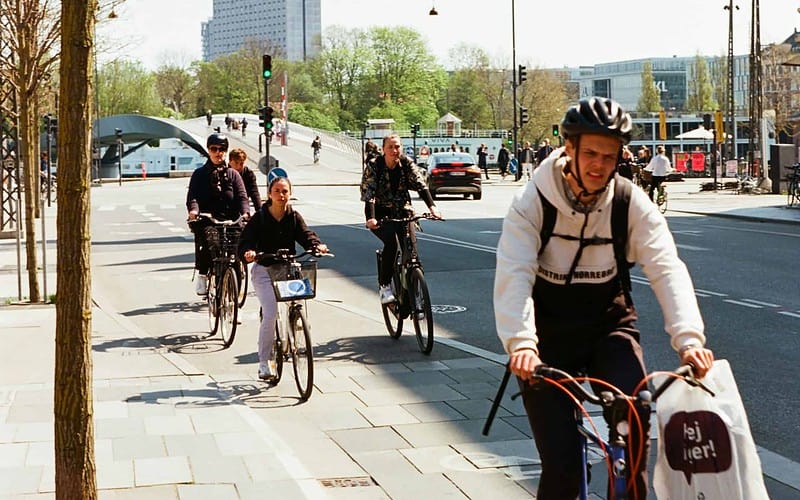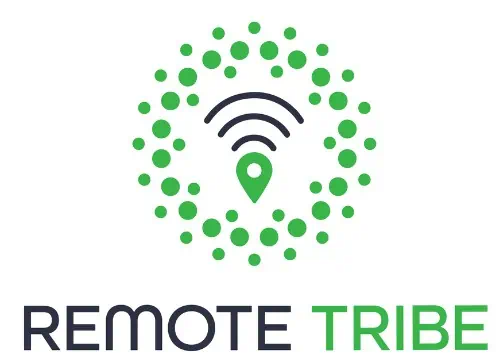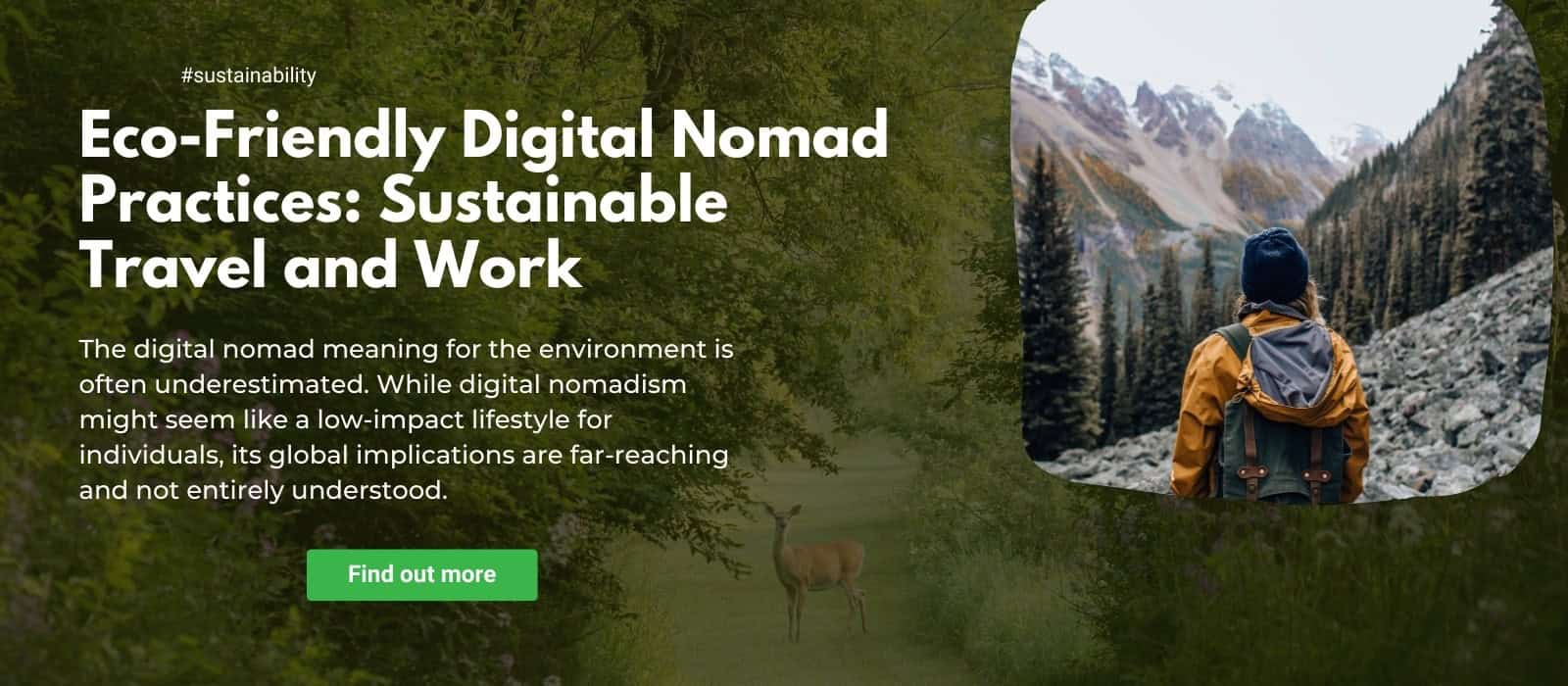The digital nomad lifestyle offers the freedom to work while exploring the world, all while carrying your office in a backpack. It’s a dream that has come true for many, thanks to the rapid advancement of internet technology. However, as we traverse the globe, it’s crucial to consider our environmental footprint. Enter sustainable travel. In this guide, we’ll explore sustainable travel practices tailored for digital nomads. From eco-friendly destinations to practical tools, we’ve got you covered.
Top Sustainable Travel Practices
The digital nomad meaning for the environment is often underestimated. While digital nomadism might seem like a low-impact lifestyle for individuals, its global implications are far-reaching and not entirely understood. The effects span social, political, and economic spheres and undoubtedly have significant environmental consequences.
Consider the disposable water bottle you might recycle at home. In another country, that same bottle could end up in a landfill. Similarly, the renewable energy powering your laptop might be replaced by coal-generated electricity in different parts of the world. These might seem like minor issues, but they accumulate over time.

Table of Contents
1 Choosing Eco-friendly Transportation
Instead of using taxis or rental cars, why not opt for public transport, rent a bike, or simply walk? These alternatives not only lower your carbon footprint, but they also provide a more genuine feel of the area you’re exploring. For longer journeys, trains are a better choice than planes. If flying is unavoidable, choose direct flights since takeoffs and landings consume the most fuel.
2 Sustainable Accommodation
For digital nomads, choosing eco-friendly accommodations can make a significant positive impact on the environment. A growing number of hotels, hostels, and Airbnb properties are implementing sustainable practices like energy-efficient lighting, water-saving initiatives, and waste reduction programs.
Opting for eco-lodges or sustainable hotels, which are frequently certified by bodies such as Green Key or LEED, can be a great decision for those who prioritize sustainability. Additionally, consider home-swapping platforms like Noad or connecting with friends and acquaintances via social media platforms like Facebook or Instagram to find a place to stay.
Subscribe to our Newsletter
Get The Latest News On Digital Nomads, Money Online, Cool Remote Working Communities, And Much More.
Spam-Free, Unsubscribe anytime!
3 Join Communities
This is a great way to learn digital nomad travel hacks from locals or more experienced travelers. You can also learn more about digital nomad jobs, the situation in the country, and greener ways to travel around the area. You can find friends or even a date on local forums, social networks, or even dating apps.
Tip! Keep in mind that some social networks and dating apps may not be available in your new country. If you have an international travel VPN, this will not be a problem. You can even use Tinder VPN to unblock your account. The best travel VPN also allows you to remain anonymous and private. Nowadays, having a travel VPN is not something optional, but rather a key companion when traveling.
4 Reducing Carbon Footprint
Taking control of your own work environment means you can significantly influence your work-related carbon footprint with minimal effort. Here are some environmental advantages of remote work:
- Less Dependence on Cars and Public Transport: By working from home, you reduce air pollution and lessen the consumption of fossil fuels.
- Decreased Need for Office Infrastructure: Remote work minimizes the demand for high-maintenance and often inefficient office setups, thus aiding environmental conservation efforts.
- Adopting a Paperless Workflow: Going digital helps reduce deforestation and lowers resource consumption linked with traditional office practices.
5 Reducing Plastic Use
Single-use plastics pose a significant threat to our environment, but digital nomads can make a positive impact by adopting sustainable habits. One effective way is to carry a reusable water bottle with a built-in filter, ensuring clean drinking water wherever you go. Reusable shopping bags, utensils, and straws also contribute to reducing plastic waste. Additionally, choosing products with minimal or recyclable packaging can further lessen your plastic footprint.
6 Supporting Sustainable Businesses
Supporting the local economy sustainably is essential. Digital nomads can back local farmers, artisans, and businesses committed to sustainability. By consuming local, seasonal foods, they can reduce the carbon footprint tied to food transportation and encourage healthier eating habits. Furthermore, opting for activities and tours led by eco-friendly operators ensures tourism positively impacts both the local community and the environment.
7 Responsible Consumption
Indulge in local delicacies and purchase locally-made products to not only support the community but also help the environment. By choosing local, you minimize the carbon emissions associated with transporting goods over long distances. Plus, you get to immerse yourself in genuine, one-of-a-kind experiences that store-bought, mass-produced items simply can’t provide.
Single-use items are a significant contributor to global waste. To combat this, consider bringing along reusable items such as water bottles, shopping bags, coffee cups, and cutlery. When you have access to recycling facilities, make a conscious effort to recycle. Together, these small changes can make a big impact on our planet.
8 Efficient Use of Digital Devices
Energy consumption can quickly escalate if left unchecked. To conserve energy, always switch off your devices when they’re not in use. Additionally, unplug chargers since they continue to draw power even when they’re not actively charging a device. Consider using eco-friendly options such as solar-powered chargers to further reduce your energy footprint.
9 Redefining the Workspace
Virtual meetings, conferences, and collaborative projects now offer immersive experiences that allow us to work from virtually anywhere. This evolution fosters deeper exploration, enabling individuals to engage with local cultures and environments without the environmental impact of traditional travel.
Digital nomads are revolutionizing the workforce by decentralizing traditional production hubs, promoting equitable distribution of work, and alleviating pressure in overburdened areas while bringing new opportunities to underserved regions.
What are your thoughts? Do you envision other possibilities unfolding? Reflecting on these issues is crucial, and there are no incorrect perspectives.
Guide For Digital Nomad Travel And Sustainable Remote Working Practices
Our work habits significantly influence our environmental footprint, and this is especially true for digital nomads. Here’s how you can make your work practices more sustainable:
Choose Co-Working Spaces
Opting for co-working spaces is more energy-efficient compared to working from a coffee shop or your accommodation. These spaces often provide a community atmosphere, enabling you to network with other professionals and exchange sustainability ideas.
Use Sustainable Digital Services
When selecting digital services such as web hosting, cloud storage, or digital marketing tools, prioritize companies committed to sustainability. This choice supports eco-friendly businesses and minimizes your digital carbon footprint.
Promote Sustainable Products and Services
If you have a blog, YouTube channel, or social media platforms, use them to showcase products and services that encourage sustainable living. This not only helps these businesses grow but also raises awareness about sustainability among your audience, creating a broader environmental impact beyond just business growth.
Sustainable Cities for Eco-Friendly Digital Nomads

Sustainability goes beyond personal choices; it’s also about the destinations we choose to explore. Some cities and countries set remarkable examples in sustainability, making them perfect for eco-conscious digital nomads.
Here are some top picks:
- Copenhagen, Denmark: Often ranked as the world’s greenest city, Copenhagen is on track to be carbon-neutral by 2025. With its excellent public transportation, extensive bike paths, and focus on renewable energy, it’s a paradise for sustainable living.
- Vancouver, Canada: Known for its lush green spaces and commitment to clean energy, Vancouver offers a blend of urban life and nature. The city’s Greenest City 2020 Action Plan aims to make it the greenest city globally.
- Singapore: Despite its small size, Singapore excels in green urban planning. Dubbed the ‘Garden City,’ it provides a high quality of life, fantastic co-working spaces, and stringent environmental regulations.

- Berlin, Germany: Berlin stands out with its eco-friendly neighborhoods, robust recycling programs, and thriving organic food scene. It’s a prime spot for green living.
- Costa Rica: If a tropical setting is more your style, Costa Rica is known for its rich biodiversity and steadfast commitment to sustainability. It aims to be the world’s first carbon-neutral country

Final Thoughts
Striking a balance between adventure and environmental care isn’t merely an objective but a collective duty. Digital nomads, fueled by their love for diverse cultures and unique experiences, should adopt a thoughtful mindset, making conscientious decisions and promoting ethical standards.
By endorsing slow travel, backing innovative startups, adopting reusable products, and swaying major corporations, digital nomads transcend typical travel—they become trailblazers of a sustainable future.
Your Travel Resources Handy In One Place 🗺️
🧳 Travel Insurance
Enjoy peace of mind during traveling and don’t leave your country without good travel insurance. We recommend Insured Nomads or Genki for international travel insurance.
💰Travel Finances
Get your travel finances smart and straight with Wise or Revolut.
🏨 Accommodations
For a short stay check out Booking or Agoda. Staying longer? Take a look at the offers at Airbnb. Hostels are the cheapest option that you can explore at Hostelworld.
🏡 Recommended places for long-term stay
Wanna know the accommodations where we lived during our digital nomad journey? Check out the places we enjoyed the most!
🎫 Book tours
Are you up for taking part in epic guided tours? Book ones you like using GetYourGuide or Viator.
🚗 Rent a car
To find great rental car deals check out Rental Cars and get ready for your car trip!
✈️ Book a flight
For the hottest deals check out Skyscanner, Kayak, Google Flights or WayAway.
🛡️ VPN
To stay safely connected while traveling, don’t forget about a good VPN. We recommend Surfshark or NordVPN.









